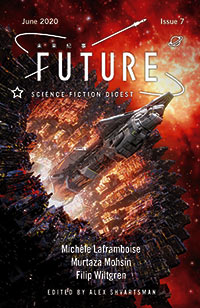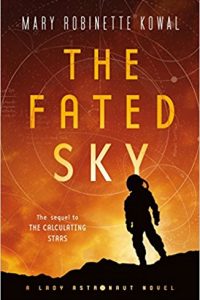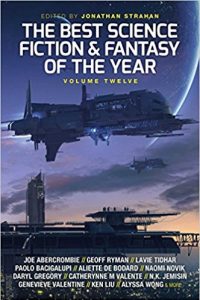Karen Burnham Reviews Short Fiction: Future SF, Diabolical Plots, Cosmic Roots, Daily SF, and Bunkerpunk
 Future SF Digest 6/20
Future SF Digest 6/20
Diabolical Plots 9/20
Cosmic Roots and Eldritch Shores 8/20
Daily SF 9/20
Bunkerpunk, Thea Boodhoo, ed. (Sudowriters) July 2020
Future SF Digest continues to provide great fiction from all over the world. “Cousin Entropy” by Michele Laframboise (translated by N.R.M. Roshak) has a wonderfully Stapledonian scope. There are the Unattached (extremely post-human) and the Attached (still vaguely biological), and stars, galaxies, and black holes all communicating as the universe winds down. This is absolutely charming hard SF (not a usual pairing of adjective and subgenre), and while I often dislike ambiguous endings, physics dictates that this story can’t end any other way. “Sunstrewn” by Murtaza Mohsin, a Pakistani writer, imagines the trope of a pair of foes locked in endless combat on ruined worlds. The narrator (clearly Hindu) has been fighting Abdul (clearly Muslim) from world to world for centuries; at this point they know each other better than any other living being – so when the world they’re on starts to disintegrate around them, they call a truce, realizing their deep respect for each other. The latter half of the story takes a strange turn when aliens with the form of the god Ganesha force them to fight each other once more, and I suspect the ending will read different ways to different people. This is a good entry for this particular trope. Finally, “Twenty-Seven Gifts I Saved for You” by Filip Wiltgren follows a woman whose spouse, an astronaut/researcher, disappeared on mission. Each year she marks their birthday, and through these vignettes we follow her as she lobbies to continue the search for the crew, and against them being declared dead, delves into alcoholism and becomes estranged from their daughter, starts to study physics, and develops a crackpot theory that just might enable a rescue mission. This is a complete story, even given its structure-in-sketches.
I was happy to drop into a couple issues of Diabolical Plots this month. The first story in issue #66 was particularly interesting: “Finding the Center” by Asian-American writer Andrew K. Hoe imagines a cop whose wife has been killed by a criminal Syndicate. With his daughter in tow, he uses his superpower: absorbing and transforming the racist stereotypes of those he meets. Sometimes this works in his favor, as many people believe Asians are fantastic and math and computers, allowing him to hack into their systems. Sometimes it isn’t, when hoped for kung-fu powers fall prey to the idea of the wizened old master stereotype of the movies. He hates that his daughter is seeing him move through the world like this, and he encounters an antagonist who has bent similar powers in a very different way. This is thought provoking in a very uncomfortable way, from an author who has obviously lived the reality.
Issue #67 starts with a flat-out tear jerker in “The Last Great Rumpus” by Brian Winfrey, as a ghost dog raises joyful havoc at a flesh-and-blood dog park. A ghost-sensitive human has been caring for it while it starts to lose its ghostly form, and this is its last hurrah. Then in “That Good Old Country Living” by Vanessa Montalban, there is a future inhabited only by robots – all other life appears to be extinct. A group of them visits a recreated “farm” to imagine what organic life might have been like. It’s funny and poignant at once.
Cosmic Roots and Eldritch Shores has a lovely story in August with “Glory Whales” by Marc A. Criley. A happily married couple has been manning a solar system traveling ship for 15 years when they’re diverted to check out an interstellar voyager (a la ‘Oamuamua in 2017). It’s headed for the Sun, and they’re damaged when it explodes, scattering shards of itself all over nearby space. They engineer a classically implausible hard SF escape from their predicament, but will they live to see what grows from the seeds dispersed by the visitor?
Daily SF continues to provide flash fiction to the email inboxes of anyone who wants it. I was able to read through their September stories, and I liked “Screen Time” by Koji A. Dae. An older woman with an ancient tablet contacts her son to let him know that he’s dying. She remembers getting the tablet for him as a boy; now he’s an uploaded digital being and he can’t understand why she won’t join him in the disembodied world. There’s a nice touch where his presentation of his face keeps shifting as the conversation evolves. It’s a poignant story. Marie Vibbert‘s “Iron Priest” packs a punch as a “priest” at work deactivating killbots at the end of a war first switches on their conscience circuits, forcing them to feel remorse for all they’ve done before absolving them for whatever afterlife awaits them. He gets into a dialog with one such victim, which goes to interesting places. The nice thing about flash fiction is that you get all the payoff of the action without having too much time to think about the “whys” of any given setup. This story is just the right length. Preston Grassman has an interesting take on Fahrenheit 451 in “Literary Cocktails” where the forbidden texts are associated with the taste and smell of certain drinks – a White Russian gets you Notes From the Underground, for instance. “All Our Secrets Revealed” by Dafydd McKimm is a sweet story. The protagonist exorcises ghosts, helping finish their business and usher them to the other side. This magician died and wants to finish his tour, a much more extensive commission than he’d ever imagined. But as he learns to do magic while the ghost inhabits him, their relationship slowly deepens. “Ten Secret Things You Don’t Know About Closet Monster” by Susan Taitel is funnier – a listicle that combines parental and career anxiety through the monster-under-the-bed trope.
“Mothers and Sons” by George Nikolopoulos imagines a world-crushing tyrant with supernatural abilities, and the lengths to which time traveling rebels will go to destroy him. His own mother recognizes the monster she gave birth to and goes back in time over and over to try to find a jonbar point where he can be thwarted, finally going to the most extreme length. My favorite of all the Daily SF stories this month is “Useful Guinevere and the Bio-Mechanical Dragons of Neptune” by Tina Connolly. In this far future people can buy and sell planets, and to keep the super-rich entertained they play at dark vs. light conflict. Guinevere is on the “good” side, helped by partner Io to defeat all manner of fake beasts, including dragons, in clever ways. When she defeats this particular dragon even after her sword breaks, she makes a discovery that casts her relationship with Io in a very different light. It’s a fun story.
Bunkerpunk is a free online anthology of six flash fiction pieces, all written in the early days of the pandemic lockdown. They all imagine people at some point choosing to live in bunkers of some nature, and then what happens when it’s time to come out. The one I found most memorable is “The Dead Do Not Live Underground” by James Yu. Hadrian leads a group that goes through bunkers one by one, seeking to bring people back into society. They mostly find corpses, but there are enough threats that one of his robot assistants is developing a hair trigger for violence. He reflects on what society wants versus what individuals need, and then has to think fast when it appears that one bunker might finally have live people.
Recommended Reading
“Useful Guinevere and the Bio-Mechanical Dragons of Neptune”, Tina Connolly (Daily SF 9/18/20)
“Glory Whales”, Marc A. Criley (Cosmic Roots & Eldritch Shores 8/20)
“Finding the Center”, Andrew K. Hoe (Diabolical Plots 9/20)
“Cousin Entropy”, Michele Laframboise (Future SF Digest 6/20)
Karen Burnham is an electromagnetics engineer by way of vocation, and a book reviewer/critic by way of avocation. She has worked on NASA projects including the Dream Chaser spacecraft and currently works in the automotive industry in Michigan. She has reviewed for venues such as Locus Magazine, NYRSF, Strange Horizons, SFSignal.com, and Cascadia Subduction Zone. She has produced podcasts for Locusmag.com and SFSignal.com, especially SF Crossing the Gulf with Karen Lord. Her book on Greg Egan came out from University of Illinois Press in 2014, and she has twice been nominated in the Best Non Fiction category of the British SF Awards.
This review and more like it in the November 2020 issue of Locus.
 While you are here, please take a moment to support Locus with a one-time or recurring donation. We rely on reader donations to keep the magazine and site going, and would like to keep the site paywall free, but WE NEED YOUR FINANCIAL SUPPORT to continue quality coverage of the science fiction and fantasy field.
While you are here, please take a moment to support Locus with a one-time or recurring donation. We rely on reader donations to keep the magazine and site going, and would like to keep the site paywall free, but WE NEED YOUR FINANCIAL SUPPORT to continue quality coverage of the science fiction and fantasy field.
©Locus Magazine. Copyrighted material may not be republished without permission of LSFF.







